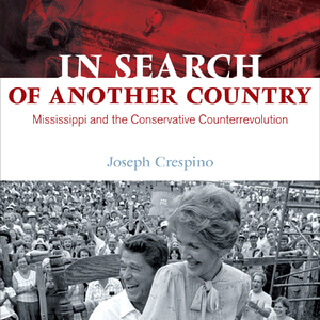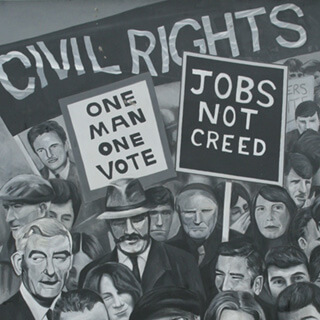Overview
In this essay, excerpted from A History of Prejudice: Race, Caste, and Difference in India and the United States (Cambridge University Press, 2013), Gyanendra Pandey proposes two levels of prejudice useful in comparing the long experiences of subordination and stigmatization of African Americans and Indian Dalits (formerly known as Untouchables).
Introduction
 |
I begin an exploration of the history of prejudice by looking at the process of othering—or social and political distancing—that is a central part of the history of African Americans and Dalits (formerly known as Untouchables), two long subordinated and stigmatized groups in the United States and India, respectively. The juxtaposition of two rather different locations and histories and, within each of them, of very different kinds of public and private narratives of struggle, allows us a view of the workings of prejudice in unlikely forms and places.
To underline the complexities of the inquiry, I propose a rough-and-ready distinction between a "vernacular" and a "universal" prejudice. The former is, in simple terms, local, localizable, relatively visible, and sometimes acknowledged: say, the prejudice against blacks, Untouchables, gays, Muslims, Jews, conquered indigenous populations, recent immigrants, women, and other "minorities." It refers to calculated behavior that we sometimes condemn—when we notice it, or when it is forced on our attention: racism, casteism, patriarchy, heteronormativity, reductive monoculturalism. Vernacular prejudice appears as bias, malice, or inherited structures of discrimination, which the state believes it can measure, define, or contain.
I call such prejudice "vernacular" to distinguish it from another kind that is largely invisible because it is widespread ("universal") and hence perceived as "natural." This "universal" is the language of law and state: and it passes for the common sense of modern society, rarely acknowledged as prejudice. At this level, the history of prejudice becomes even more intractable for it is, simultaneously, everywhere and nowhere.
Prejudice and Public Discourse in the United States and India
What I have attempted to do in A History of Prejudice is to explore some of the circumstances and ways in which the matter of prejudice—"visible" and "invisible"—has shaped the history of African Americans and Dalits (or ex-Untouchables), and by extension the history of the United States and India, over the last century and more. It should be obvious that many of the quandaries and challenges considered here do not apply to these minorities alone, although it will be clear, too, that prejudice and its costs affect different populations, and differently disenfranchised and marginalized groups, in many distinct ways. The proposition is perhaps self-evident. However, its force and its fallout, not always adequately appreciated, may be illustrated simply.
"Hindustanmein rehna hai, to humse milkar rehna hoga / Hindustan mein rehna hai, to bande mataram kehna hoga," as Hindu right-wing political forces have it, in a slogan that has appeared over and over again in attacks against the Muslim minority in India, in the mouths of political agitators, and on city walls, especially since the 1980s. "Those who wish to live in Hindustan will have to live like us / Those who wish to live in Hindustan will have to say 'Bande Mataram'" (Victory to the Mother, i.e., the mother goddess, who is also Mother India). In an echo of the "Jewish question" of the nineteenth and twentieth centuries, Muslims can live in India, as long as they stop being Muslims. Samuel Huntington articulates much the same kind of proposition for immigrants from Mexico who have come to live, work, and die in the United States (in quite significant numbers even in military service, to which the American establishment readily welcomes them). "There is no Americano dream," he writes. "There is only the American dream created by an Anglo-Protestant society. Mexican-Americans will share in that dream and in that society only if they dream in English."1Samuel P. Huntington, "The Hispanic Challenge," Foreign Policy, March 1, 2004, accessed January 4, 2013, http://www.foreignpolicy.com/articles/2004/03/01/the_hispanic_challenge. Here, the suggestion goes, as in the case of Jews ceasing to be Jews, or Muslims Muslims, is another impossibility.
The two slogans just quoted should suffice to indicate some of the demands still being made of minorities, Muslims in India and Latina/Latino migrants to the USA, in these instances, to assimilate, to conform, to change themselves—if indeed they can. Upward social mobility is the presumed route out of conditions of subordination and marginalization the world over. Yet, the implications and rewards of upward social and economic mobility have rarely been as straightforward or smooth as narratives of rags to riches, or fortune favoring the brave (or the enterprising), would have it.
. . .
Early in 2001, a Dalit columnist began writing a weekly column entitled "Samasyaen Daliton Ki" (The Problems of the Dalits) in a major Hindi daily published from New Delhi.2Samasyaen Daliton ki (The Problems of the Dalits), Rashtriya Sahara (New Delhi, India), 2000–2002. The public exchange that followed in the form of letters written to the columnist in 2001–2002 is worth considering.
Some letters warn the columnist of anthrax attacks, if he does not stop abusing his upper-caste readers, that is, if he does not stop criticizing the Hindus and their religion, dividing the nation, forgetting the duties of Indian citizens, forgetting what we have done for you, and forgetting his—inherited—place. Some of the same letter-writers, while abusing and threatening the columnist and his relatives, also demand the publication of their letters, and warn of untoward consequences if publication is refused. This exhibition of unashamed aggression on the part of the "respectable" must give us pause. The threat of open violence, accompanied by the use of lower caste names such as Chamar and Dom as insulting epithets to humiliate the addressee, an act that is now a cognizable offence under Indian law, speaks of the arrogance of power; of groups who believe they are above the law and other requirements of 'civil' society, at least in their dealings with certain kinds of people; and of unshaken belief in the upper castes' right to rule.
Two letters make the point succinctly. One says: "Upar vale ne tumhein banaya hai hamari seva karne ke liye" (The Almighty has made you [precisely] to serve us). The second: "Hamare joothe tukde khane vale, hamare bailon-bhaison ke gobar mein se dane nikal kar khane valon, hamare mare hue jaan var khane vaalon, hamare saamne tumhari himmat kaise hoti hai hamare khilaf baat karne ki" (You who eat the crumbs left over on our plates, who eat the grains you pick out of the shit of our cattle, who eat the remains of our domestic animals that have died, how dare you speak out against us, in our presence)?
I could multiply these examples of abuse and arrogant statement of inherited privilege. Instead, I will conclude by referring to a much more polite intervention that nevertheless re-states the dominant upper-caste and upper-class belief in the appropriate place of the Dalit, or any other minority voice, in the order of things and in the business of development. This particular letter comes from a Brahman male who lives in Delhi, on the eastern (less salubrious) side of the river Jamuna. Addressing the Dalit columnist in the most respectful traditional terms ("honorable Mr.___," "respectful salutations"), he writes that he has been reading the column on "The problems of the Dalits" for some time, and recognizes that "somewhere," in some important way, "what you say is true." However, he asks,
Will you tell me whether you think of yourself first as a Dalit, [a member of] a so-called low caste, or as an Indian? If the answer is 'Indian,' then I plead with you not to divide this nation up further, physically or psychologically. In my view you are capable of lifting up the Dalit community of the entire country through education, thereby contributing to the progress of the nation. You must endeavor to lift them up out of the feeling of being Dalits or so-called low castes, and make them [conscious of being] Indians. Let them know that we are not Brahmans, Kshatriyas, Vaishyas, Shudras, we are nothing but Indians and will remain [nothing but] Indians . . .
The correspondent then expresses his judgment against affirmative action, or constitutional provisions for the reservation of a quota of educational and political positions for people from lower-caste backgrounds. "There are other ways of lifting up [the Dalits]." "Reservations . . . harm the nation."
This 'sympathetic' reader believes in the necessity of the columnist playing the role of the leader, not of course of the country at large, but of his community: "you are capable of lifting up the Dalit community" and thereby "contributing to the progress of the nation." Note the unselfconsciousness of the inquiry, "Are you an Indian first or a Dalit first?," a question periodically posed to Muslims and other minorities as well, but never to upper caste/upper class Hindus. For the latter are the nation, invisibly and axiomatically. In this framework, India (and 'mainstream' Indians) are abstract and unmarked categories, while Dalits emerge as a local, vernacular grouping, with identifiable but manifestly local problems: minorities that must never forget that these are, in the end, sectional matters, minor in comparison with the universal concerns of mainstream India and mainstream humanity.
A parallel invective, not entirely dissimilar from that heaped on Dalit activists, is found in a very large number of right-wing commentaries on the current president of the United States. The canard extends from claims about Barack Obama's supposed foreign birth, suggesting that as someone who is not a native-born American he is ineligible to be president of the country, to accusations that he is a closet Muslim, a traitor, even a supporter of terrorists. Thus Rush Limbaugh stated in August 2010: "I have not [called him] Imam Hussein Obama. . . . Imam Barack Hoover Obama is the correct nomenclature." However, says Limbaugh, the number of Americans who believe he is Muslim is increasing: "Imam Obama is becoming more well-known and the media can't protect him." He offers an explanation: "[W]hy did I start calling him Imam Obama?" It was "the natural thing to do when he came out in favor of the mosque [a proposal to build a private Muslim community center in a building near Ground Zero in New York, which became notorious as the "mosque" controversy]. It's no different than calling it the Hamasque, because Hamasque [Hamas, the militant Palestinian party that currently forms the government in the Gaza strip] has come out in favor of the mosque."3Rush Limbaugh, "Imam Barack Hoover Obama and Fellow Democrats are Living a Lie," The Rush Limbaugh Show, transcript, August 19, 2010, accessed January 4, 2013, http://www.rushlimbaugh.com/daily/2010/08/19/imam_barack_hoover_obama_and_fellow_democrats_are_living_a_lie.
However much leftists, liberals, and other "un-American" types try to hide who they really are, Limbaugh goes on to say, "the truth is eventually gonna surface." But "once you start telling lies and once you start living a lie, you are doomed because you will not be able to remember who you told what. You're gonna get found out, you're gonna get caught at some point." Further: "[W]e are a great country at risk in a dangerous world. We have threats external and internal. And it is not a good sign. It is not something healthy for the American people to not know what religion their president is, . . . where he's been and who he is, it's not healthy, it's not good."4Ibid. The easy assumption of the position of proconsul, of the purveyor of the "good" and the "healthy" and the defender of Americanness, is a mark of mainstream arrogance; more specifically, that of the white, Anglo-Saxon, Protestant, heterosexual male. "It is inconceivable," as a New York Times editorial put it, "that this campaign to portray Mr. Obama as the insidious 'other' would have been conducted against a white president."5"A Certificate of Embarrassment," The New York Times, April 27, 2011, accessed January 4, 2013, http://www.nytimes.com/2011/04/28/opinion/28thu1.html.
Consider just one more example of this common-sense, modernist call to militarism and masculinism, with its singular reason and its singular understanding of the "natural" American and the healthy and good society. Dinesh D'Souza recently published an article in Forbes magazine previewing a longer statement in a book entitled The Roots of Obama's Rage—an article that drew praise from the former Speaker of the US House of Representatives and candidate for the Republican nomination for president in 2012, Newt Gingrich. "Incredibly," writes D'Souza, "the US is being ruled according to the dreams of a Luo tribesman of the 1950s [Luo being the Kenyan tribe Obama's father is said to have come from]. This philandering, inebriated African socialist, who raged against the world for denying him the realization of his anticolonial ambitions, is now setting the nation's agenda through the reincarnation of his dreams in his son." Thus, one can understand the president only "if [one] understands Kenyan, anticolonial behavior." And then we get to the clinching argument about "the Other." Barack Obama was raised "offshore": he spent "his formative years—the first seventeen years of his life—off the American mainland, in Hawaii, Indonesia and Pakistan, with multiple subsequent journeys to Africa."6Dinesh D'Souza, "How Obama Thinks," Forbes, September 9, 2010, accessed January 4, 2013, http://www.forbes.com/forbes/2010/0927/politics-socialism-capitalism-private-enterprises-obama-business-problem.html. Voilà!
The call is this, in other words: "Imam Barack Hussein Obama, take yourself and your crazy, socialist ideas back to where you/they come from—Africa (or Indonesia, not to mention Pakistan)." Not quite on par with the extremist Hindu right wing's demand in India: "Babar ki santan / Jaao Pakistan ya Kabristan" ("Descendants of [the Mughal Emperor] Babar [i.e., Muslims of India], [take your choice]: go to Pakistan or to the grave"). There is no parallel foreign country to which people of African descent in the United States (or of Untouchable descent in India) may be banished, even ideologically. But the attack is not altogether different in its effect. It is a proposition that we have encountered many times over in the annals of American and Indian democracy and nationhood: don't forget how lucky you are; don't forget where you came from (and what you've attained); don't forget what we—the unmarked, natural citizens, the real Americans and Indians, the nation—have done for you. 
About the Author
Gyanendra Pandey is Arts and Sciences Distinguished Professor, and Director, Colonial and Postcolonial Studies Workshop, in the Department of History at Emory University. A founding member and leading theorist of the Subaltern Studies project, he has written extensively on marginality and citizenship, violence and history. His book, The Gyanendra Pandey Omnibus, brings together three monographs by Pandey on class, history, and politics in India.
This essay is from A History of Prejudice: Race, Caste, and Difference in India and the United States by Gyanendra Pandey, forthcoming from Cambridge University Press, January 2013. Used by permission of the publisher.
Recommended Resources
Fredrickson, George M. White Supremacy: A Comparative Study in American and South African History. New York: Oxford University Press, 1981.
Pandey, Gyanendra. Subaltern Citizens and their Histories: Investigations from India and the USA. New York: Routledge, 2009.
Web
Dalit Foundation
http://www.dalitfoundation.org.
International Dalit Solidarity Network
http://idsn.org.
Similar Publications
| 1. | Samuel P. Huntington, "The Hispanic Challenge," Foreign Policy, March 1, 2004, accessed January 4, 2013, http://www.foreignpolicy.com/articles/2004/03/01/the_hispanic_challenge. |
|---|---|
| 2. | Samasyaen Daliton ki (The Problems of the Dalits), Rashtriya Sahara (New Delhi, India), 2000–2002. |
| 3. | Rush Limbaugh, "Imam Barack Hoover Obama and Fellow Democrats are Living a Lie," The Rush Limbaugh Show, transcript, August 19, 2010, accessed January 4, 2013, http://www.rushlimbaugh.com/daily/2010/08/19/imam_barack_hoover_obama_and_fellow_democrats_are_living_a_lie. |
| 4. | Ibid. |
| 5. | "A Certificate of Embarrassment," The New York Times, April 27, 2011, accessed January 4, 2013, http://www.nytimes.com/2011/04/28/opinion/28thu1.html. |
| 6. | Dinesh D'Souza, "How Obama Thinks," Forbes, September 9, 2010, accessed January 4, 2013, http://www.forbes.com/forbes/2010/0927/politics-socialism-capitalism-private-enterprises-obama-business-problem.html. |



